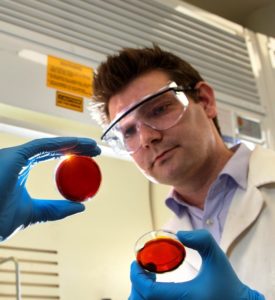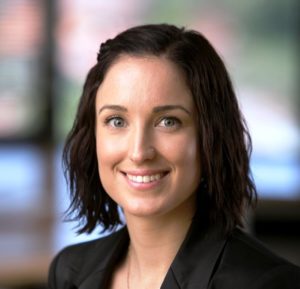
Two of Flinders University’s bright young minds have received SA Young Tall Poppy Science Awards in recognition of their leadership and contribution to the sciences.
Dr Justin Chalker and Dr Nicole Lovato have been selected for their outstanding research and ongoing commitment to community engagement.
Dr Chalker, Lecturer in Synthetic Chemistry, has been recognised for his work in the field of organic chemistry, in particular detecting diseases using new diagnostic tools and creating biodegradable wound dressings for burns victims.
There is also the innovative rubber that he has developed (made from waste sulphur and plant oils) to filter water and air and capture mercury toxins.
Dr Chalker says mercury pollution is a global crisis and that he has grave concerns for the intentional use of mercury in small-scale goldmines overseas.
He said that excess mercury run-off into waterways that are used for drinking and irrigation affects millions of people. He believes that exposure to this metal can cause chronic problems including high infant mortality rates, stunted growth, deformed limbs and cognitive disorders.
“It is depressing but we think we can contribute to the solution,” Dr Chalker told The Advertiser.
Dr Chalker is passionate about using science to make a difference to the world. He actively promotes his work at public science shows, such as Science Alive and schools.
“Science is fascinating and essential to solving global problems,” he says.

Dr Lovato, research associate at Flinders School of Medicine, will receive her award for work into understanding the basic aspects of sleep, circadian rhythms and psychology that impact on daytime function.
She is applying this knowledge to a clinical framework to prevent sleep disorders such as chronic insomnia and associated mental health problems including suicide in adolescents.
“My research has shown that poor sleep is associated with a host of adverse effects including sleepiness, fatigue, difficulty concentrating, increased accidents and ill health,” Dr Lovato says.
“For an individual suffering from sleeping difficulties, these consequences have a significant impact on their physical and psychological health, relationships with family and friends and ultimately their quality of life,” she says.
Dr Lovato is aware of the importance of engaging the community with her work to ensure that the direction of her research is well informed and that the findings have the greatest reach and impact. She is a regular guest lecturer to a range of community groups and an active media spokeswoman on sleep related topics.
Nine 2016 SA Tall Poppies were presented with their awards at a ceremony hosted by the Governor, Mr Hieu Van Le AC, at Government House on 1 August.
They also included Dr Luke Bennetts, Dr Camille Short and Dr Lyndsey Collins-Praino (University of Adelaide), Dr Tom Raimondo and Dr John Arnold (University of South Australia), Dr Heidi Alleway (Primary Industries and Regions SA) and Dr Susan Wood (University of Adelaide and SAHMRI).
Dr Chalker has also been chosen as a finalist for the overall Tall Poppy award in the SA Science Excellence Awards to be announced on Friday 12 August at the Adelaide Convention Centre.
You can read about Dr Chalker’s work here

